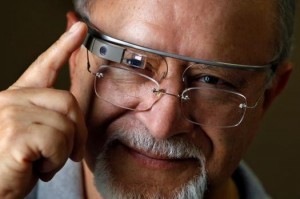St. Joseph Interpreter Gets Early Peek at Google Glass
 Keith Myers | The Kansas City Star Google Glass user Al Navas of Country Club, Mo., on the north side of St. Joseph, can control the device by voice or by tapping or swiping his finger along the side. Interpreter Al Navas looks forward to a day when he can help police officers communicate with Spanish-speaking car accident victims before he even gets to the scene of a wreck.
Keith Myers | The Kansas City Star Google Glass user Al Navas of Country Club, Mo., on the north side of St. Joseph, can control the device by voice or by tapping or swiping his finger along the side. Interpreter Al Navas looks forward to a day when he can help police officers communicate with Spanish-speaking car accident victims before he even gets to the scene of a wreck.
Navas, a Spanish interpreter in St. Joseph, thinks he’s gotten his hands on the device that will help him do just that: Google Glass. Navas and about 8,000 other people in the country got to buy Google Glass months early for $1,500. Navas and others posted on Google Plus and Twitter what they would do if they had the wearable computer that fits like a pair of glasses and projects a small screen above the user’s right eye.
“It looks pretty dorky,” he said. “But as an early adopter, I don’t mind a bit.”
Navas got his sneak peek at Glass after writing that he’d use it to help with his work as an interpreter for law enforcement officials. For example, Navas said, if a police officer responds to an accident and the people in the car only speak Spanish, Navas could see live video on Glass to help the victims convey important medical information faster.
“I could be in the parking lot, I could be driving and interpreting in real time to help the victim,” he says. “Does the victim have pain? Is the victim able to communicate?”
Using new technology is nothing new for interpreters and translators. (Interpreters generally work with speech while translators work with documents.) In 1945, the Nuremberg Trials of prominent members of the political, military and economic leadership of Nazi Germany were an early experiment in simulatenous translation rather than consecutive translation.
The Nuremberg judges, defense and prosecution teams and defendants spoke four different languages, and a fair trial depended on proceedings that everyone could understand. Interpreters used audio technology to instantaneously interpret what was being said.
As remote communication shrinks geographic barriers, more people and businesses have turned to interpreters to help them understand legal documents, business deals and medical information.
Smartphones already let interpreters carry around dictionaries and legal and medical glossaries in their pockets. Online tools give travelers immediate, rough translations of spoken phrases.
Video conferences make interpreters more accessible, especially to people who live in rural areas, said Tony Guerra, director of interpretation services for CETRA Language Solutions, a Pennsylvania-based company that offers translation and interpretation services.
“I think the Google Glass is a very direct offshoot from that camp,” he said of the portable computer that is equipped with a camera and Internet capabilities.
He’s not sure about his company’s future with Google Glass, but he said he’ll be watching it to see how much it costs and how its online and recording features would affect the privacy concerns that interpreters often deal with.
Bruce Knapp, owner of the Kansas City-based interpretation and translation company Alpha & Omega, said technologies such as smartphones and maybe one day Google Glass are tools interpreters can use — but the quality of an interpreter or translator is still the No. 1 priority. Interpreters at Alpha & Omega often work with hospital patients.
It’s still crucial, he said, for interpreters to stop the doctors and ask questions if the patient is confused, or to look up the exact right word to use in a given situation.
Navas agrees. Technology gives interpreters tools, but they are still imperfect. They often miss a colloquial nuance of a word or get it wrong entirely.
But he’s still an eager advocate for the groundbreaking potential he thinks Glass will have for interpreters.
“I don’t see them as a competitor, but as part of the work that I do,” he said.
Although Google Glass doesn’t yet offer the large number of user-created applications that the iPad does, Navas thinks it is only a matter of time before people develop new tools that will streamline his work as an interpreter.
“We can barely start to envision how far it will go,” he said.
Read more here: http://www.kansascity.com/2013/07/18/4353100/st-joseph-interpreter-gets-early.html#storylink=cpy
Category: On Demand Interpreting
